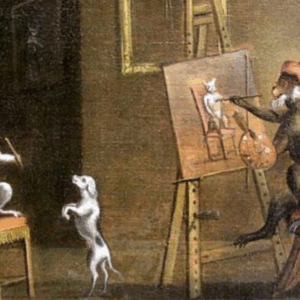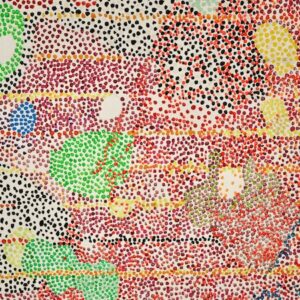“Let’s get started… Identify yourself. Please state your full name.”
You might call me an accidental scientist. Despite what they call my “exceptional qualities,” I could have died and the world would never have found out if it hadn’t been for that lucky incident.
But let me tell you the whole story, since I think we have plenty of time, and the story of what happened that day is worth it…
I was fourteen years old when the antigrav balance system of that aerobus accidentally broke down in flight. Right when it was passing over my hometown, Baracuyá del Jiquí, in the Sierra Cristal mountains… Well, it’s more of a hamlet than a town.
The two professors from the Center for Advanced Physics and Mathematical Studies who were passengers in the vehicle must have been in for a bumpy ride… All the pilot could do was make a forced landing, the aerobus wobbling like a drunken duck. But we were in luck: it came to a rest right in front of our house, on the open field where my brothers and I used to play baseball.
I remember it like yesterday. We were all arguing. My brother Romualdo had just run away from home, and without him we were only six boys and three girls. Neither team wanted Giselita, who couldn’t hit a watermelon with an ironing board. Or me, either, even though I was an okay player, because they all said my head had some of its stuffing missing. Besides, I was the youngest boy.
By the time the vehicle stopped shuddering my three sisters had already run to hide with my mother in the kitchen. Just the way my father taught them that decent women do when strangers come calling. The three of us boys who were still young, Hermenegildo and Esbértido and me, ran over and climbed onto the aerobus engine, still hot. We’d seen machines like that before already, but never so close up, and we’d never been able to touch one.
After greeting them and offering them the bacán, casabe, and pru that they were afraid to even try, my father and my older brothers tried to explain to the pilot—so tall and skinny he looked like a pitchfork—and the two doctors that there weren’t any stores or repair shops nearby that carried spare antigrav balancers, and there was no holonet connection or any sort of electronic link to the outside world. And the fastest way to get a message to the slightly larger town of Songo Tres Palmeras was to ride his compadre Robustiano’s mare there, because my uncle Segismundo’s messenger pigeons were laid up with the pip they had caught after last month’s gullywashers…
The pilot opened the engine compartment, took a look, spat out fifteen or twenty cusswords, sighed, and said his name was Larsen, and that if that’s how things were, well, there wasn’t much they could do. Afterwards he did eat try some casabe and bacán and drank some pru and even the strong coffee, brewed country-style, that my mother gave him without looking him in the eye.
Since he had forgotten to close the engine casing, I got in and started nosing around. It was so pretty, lubricated with a transparent oil that smelled nice, not like the smelly mutton grease my father made me smear over the gears of the little sugar mill and the axles of the ox cart to keep them from sticking. It all looked perfect to me—except for what I later found out was the precious antigrav balance system.
Something about it was terribly off. I’d always been handy with tools, and I loved going around looking things over and fixing them up. And since I was the youngest, it was my job to sharpen the axes, machetes, and plowshares and keep the little mill greased. Without really thinking about it, I set to work on that thing. A bit of wire here, a tiny stick there, a dab of earth over there, a pebble between these two metal clips, and…
Yikes! Suddenly the gizmo started bucking like an untamed bronco. Standing in the doorway, Larsen, the pilot, spit out the sip of coffee he had in his mouth, and I got scared and took off running. In one second it was a full-blown chase scene.
But when my father, who was familiar with my habits, started cutting a nice big poplar rod to break over my rump for meddling where I didn’t belong, Larsen stopped him.
My father nearly blew his top. Imagine: nobody had ever even raised his voice to him in his own house, and now this gangly city slicker, who wasn’t even half his boxing weight, was acting like he knew better than him how he should be treating one of his own sons! It went to his head, and… Good thing my mother stepped in and whispered, “Celedonio, just let him talk”—otherwise he would have killed the man then and there.
Larsen spoke… and then my father was so proud, he threw down the poplar switch, gave me a hug, and said I was his son, caray. Said I’d always been that way, a little strange, but better than anybody with all that mechanical stuff…
It turns out I had fixed the antigrav balance system without even realizing it. The best part was, I found out later that in theory no human being could fix one of those units, which only you xenoids were able to manufacture. They were superdurable, built to last, but when one failed you had to chuck it all out and get a new one.
And that was when the two doctors there, with their beards and their wild hair and their crazy eyes, started asking me question after question. They told me that their names were Hermann and Sigimer and that they were astrophysicists. They asked me about electromagnetism, about the Unified Field Theory, about everything. And I didn’t know how to answer any of it. Good thing Hermann had the idea of giving me his laser pen, which had stopped working days earlier—and I fixed it right away, too, with a tiny piece of glass.
Then they both said at once that I had a special gift, that I was a natural genius, a diamond in the rough. And I stood there wide-eyed, not understanding a word of it, thinking they were making fun of me, too, like my brothers… But they started talking with my father and my mother. They went off, talked for a long time, and I could see they were giving my parents money… and finally Mama came back weeping, and she hugged me. She handed me a little suitcase with all my best clothes, six small bars of guava paste, and two big bottles of pru, gave me a kiss, and told me never to forget that they loved me and that they were my mother and father. The old man hugged me, too, and his eyes were wet, but he looked away because men don’t cry, and he told me that I would be leaving with those professors and that it would be for the best for everyone. And to be a man and come out on top.
At first I didn’t want to, but when Hermann and Sigimer told me I’d be going to the city to see things and machines and learn a lot so I could be like them and serve Earth, I stopped feeling about to cry, and I boarded the aerobus, happy as could be.
And can you believe it? Even though Larsen and the doctors were scared, my repair job on the antigrav balance system held up for the rest of the trip, no problem.
“Is that your real name, please?”
I’ve never been back to Baracuyá del Jiquí. I do miss the family, but ever since I reached civilization, I’ve been involved in so many secret projects, they don’t even let me go to the corner store to buy pru anymore. My brain is a strategic weapon, they say.
Now, they do get me everything I ask for. If I ask for a bird on the wing, they bring me a bird on the wing.
I did manage to locate Romualdo. He was the brother who’d always been nicest to me. Two years ago, I started to get nostalgic about him and asked for information. Since he’d run away from home, and he’d always talked about going to the city…
Well, even though they warned me I’d only be allowed to see him from a distance, in less than a week they gave me his whole dossier and a pile of holovideos that showed him talking. My brother’s a sergeant in Planetary Security now. He lives and works in New Miami.
Knowing that, and having the holovideos, was all I needed. Why see him from a distance if he would never know I’d been nearby? Why make myself feel more alone?
And I haven’t seen or heard from anyone else in my family.
“What is your current scientific specialty, please?”
Alex Gens Smith, scientist. Terrestrial, human. Height six feet one inch, weight 172 pounds, in case you want to check.
“Are you in frequent contact with your family, please?”
Well, no, but when Hermann and Sigimer brought me to the Center, the people there told me I’d need a more serious-sounding name if I wanted to be a scientist. And they changed it for me. I’ve been saying it this way for so many years that if anybody shouted “Alesio!” at me now, I wouldn’t react.
My real name is Alesio Concepción Pérez de la Iglesia Fernández Olarticochea Vallecillos y Corrales. So, Alex for Alesio, and since Concepción is the same as Genesis, I got Gens for short. And Smith is as common an Anglo name as Pérez is in Spanish, so they’re equivalents. Simple transposition of elements.
“Do you have any other sort of stable and/or permanent emotional relationships on Earth, please?”
For the past four years they’ve kept me busy with an incredibly boring project—military in nature, like almost everything I’ve done. Well, it was classified, of course, but if you people accept me, I won’t be able to keep it a secret.
I work on a principle that a theorist worked out, based on a toy I once built to amuse myself. I’m not very good at formulae or tensor calculus, but I can tell you it has to do with graviton resonator systems.
You know, of course, that the graviton is the elementary particle with the greatest concentration of momentum, making it possible, according to the Unified Field Theory, to convert any magnetic or electrical force into gravitational force. Any child knows that, but I only learned it after I fixed the balance system on that aerobus.
The toy I made was a graviton resonator-based matter miniaturizer. I’d stick any object between the poles of a triphase magnet, supercool it to just above zero degrees Kelvin while bombarding it with positrons in a pulsating ultrasound field, and poof! It would shrink instantly. The effect was caused by overstimulating the mutual attraction between gravitons in the piece of matter. According to the Law of Conservation of Mass, its original mass was unchanged. But it became harder than bicrovan. I had artificially produced hyperdense matter, like the kind in the nuclei of neutron stars. And it was stable; it only returned to its original volume if the process was inverted, at a great expenditure of energy.
The Center people were very excited. They had me create hyperdense projectiles capable of piercing any object, and superarmored plates of compressed cork that were dense as steel. Then it occurred to me to try shrinking things further, and I produced some nano-black holes, very cute. Of course, somebody got the idea into his head of building a weapon that would reduce the enemy to nothingness. They took everything related to black holes, which was what I was really interested in, away from me and gave it to a team of PhDs with a whole mouthful of titles, and they haven’t figured out anything after all this time. They told me I had to produce a miniaturizer that would work from a distance. No matter how much I explained to them that it was impossible, because it would have to violate the law of inverse squares and relativistic mass-energy conversion, they insisted, warning me that they wouldn’t allow me to work on anything else until I did it.
That’s another reason I came here—because I’m tired of sitting on my hands, and it makes no sense to waste effort on an impossible project.
But in the meantime, I’ve been working, in secret of course, on a few other little things…
“Alex… What is the official reason for your visit to our planet, please?”
No… not what you’d really call stable or permanent relationships, I don’t. Since my childhood I’ve been very shy around women… It always seemed to me that they talked a lot without saying anything. Like some theorists, for that matter. My mother said that’s why I was so good with machines, because they never talk.
But that’s not entirely true; when I was working on Artificial Intelligence I got along very nicely with an AI that I called Meniscus.
It all started because we were both getting bored, and we entertained ourselves by competing at mental calculations… I always lost on the simple arithmetic problems, but if we went on to topological or phase equations, I walloped Meniscus. Later, when we were on closer terms, we talked about all sorts of things: about life, the mind, what it was like to have sensations and not be just a bunch of electronic impulses inside a circuit box, self-conscious but not really alive.
They erased him three months into the research. They said he wasn’t “stable” any more. I’ve never forgiven them.
I think my problem with women is actually very different. Their scent, the way they have of looking at you, of moving. They make me nervous. They can’t be… reduced to logical parameters. I know it’s the hormones; I even know which hormones, one by one. But it’s the synergy of the hormones that throws me off. Even though I understand the effects of each part, I fail to be objective about the resulting whole. I spin out of control, I forget logic.
Of course, I have had experiences. Plenty. But very… particular. When I turned eighteen, the psychologists at the Center, who kept me under special monitoring, put me in contact with various… professionals.
Social workers, of course. All of them legal, safe, discreet, healthy. Beautiful. The psychologists felt my emotional stability would appreciate an opportunity to replace my theoretical uncertainty with practical experiences.
They were right.
It was great.
Sensorially, a woman is a being of astonishing perfection, who seems to be made for giving and receiving pleasure. The meetings, three times a week, with my new “girlfriends” and their erotic skills propelled me into a period of mental hyperactivity. During that time I produced the invisibility field and outlined the principles of what would later become the silence generator.
I also had a few homosexual experiences. Out of pure scientific curiosity, not genuine inclination. To have a way of judging. How can you say something isn’t for you if you’ve never even tried it?
But it really didn’t work well at all. I guess the lessons in machismo that I’d been given as a child were ultimately stronger than any consciousness that it was all simply a matter of prejudices. Young men with waxed bodies, long limbs, smooth gestures, and fluty voices seemed like unnatural caricatures to me. Trying to imitate women and not succeeding. And the others, hairy and muscular, with booming, hypersexed voices, reminded me too much of my father to inspire any erotic notions in me.
I devoted myself fully to the female sex. Time went by… And in the end, even though they told me I was a real stud and that they were more fond of me than of any xenoid client, it started to seem… insufficient.
It was too easy. Too artificial. I wanted more.
And I thought I knew how to get it.
One of the few times they allowed me to leave the Center, I escaped from the pair of spies they had set to watch me (without my knowledge, or so they thought).
I had taken every precaution. I disguised my body odors so that the mutant bloodhounds couldn’t track me. I used interference to make the locator they had implanted subcutaneously in my sternum go haywire. In a word, I disappeared.
I wanted to live life on my own, for a little while at least. I had provided myself a phantom credit card that they couldn’t trace, so had no lack of means. I flew to New Paris, the city of love. I rented a room and got ready to enjoy the dolce far niente. And I trusted to luck for finding the woman who would make my heart throb.
But regular women didn’t find me attractive. I’m no model of male beauty… Of course, I could have had plastic surgery, but I like this face. It reminds me of my family every time I look in the mirror.
After a week of solitude, when I was starting to adjust really well to everyday life, I went back to the pros.
For three nights I spent my money hand over fist, until I was bored once more of sex and of love for sale, and I returned to my inactive solitude.
One night, when I was walking through the recreation of the Latin Quarter, I met Yleka. A woman of emerald and chocolate on the outside, a panther of honey and fire on the inside, as a verse of Valera’s puts it. Are you familiar with him? I suppose not. What a pity. Try reading him.
Yleka had been left stranded in Paris by a smooth-talking Centaurian. She didn’t have a credit to her name or a roof to sleep under. I did, and I felt lonelier than ever… We slept together. And all the rest. But I didn’t tell her I was rich. I wanted to see if that was so important.
It was a great week. She was tender and funny, and she didn’t care too much that I wasn’t very good with anything but objects and machines. That I hardly talked. She talked for us both, and I loved listening to her.
For those seven days she stopped wearing her supertight plastiskin body stocking, and she didn’t go out looking for xenoids. She said I was enough. And it wasn’t enough for me to spend all day long with her.
I think we each lost several pounds.
Things could have gone on like this a lot longer, I guess. If I had managed to keep my restless brain calm. I tried to continue my work on the silence generator, using homemade tools in my rented room, but it wasn’t the same. I missed the labs at the Center and their almost unlimited resources. A habit’s a habit.
I think my subconsciousness betrayed me, and I started making mistakes, minor acts of negligence. Leaving a trail. Doing all my shopping at the same store, going to inventor fairs, stuff like that. I wanted them to find me… and, of course, they did.
Back at the Center, it wasn’t three days before they brought Yleka back to me. But it wasn’t the same. The magic was dead. Now that she knew the balance in my bank account, I only interested her as a client. Human, not xenoid, but otherwise identical. Her orgasms seemed fake to me, no matter how passionate they were. Though she insisted that she still loved me…
Maybe her coldness was her revenge on me for lying to her. For not being just what I pretended to be. For smashing her illusions of finding happiness with a good, simple man. Even a social worker can have dreams, can’t she?
When it was obvious that things weren’t working like before, I told her I wouldn’t be seeing her any more. It was a mistake. She cried buckets and swore she loved me. But how could I know if she loved me or my credits? I told her that her love was unprovable.
Then she called me a “damned autistic” and an “unfeeling monster.” That’s the only thing that has always made me angry. Call me a stupid idiot savant, I let it pass. But to say I’m cold and heartless… I used to fight my brothers over less than that until I was out of breath and covered with bruises. Until they also started fighting anyone in our town who said it to me.
I lost control, we argued, I yelled at her… I hit her. Just once, but I felt horrible. If I hadn’t restrained myself, I would have kept on beating her. For her own good, I asked the guards to take her away.
I hated her for forcing me to do that.
And my anger made me pressure the people at the Center: it wasn’t enough to get her out of my life; I wanted them to destroy her. Not kill her, but harm her badly, forever. Or else I’d never work again.
At first they ignored me.
Then Hermann and Sigimer tried to convince me the nice way.
Later on, they used drugs, but it’s impossible to force a brain to think if it doesn’t want to.
After not touching the machines for two weeks, they gave in. They’re capable of doing anything to get what they want. And I knew it, and took advantage. They were only interested in the stuff I could do. And only indirectly, in a secondary fashion, in how I felt. I was one more instrument. Expensive, like a radiotelescope or a synchrophasotron… and as such, they had to take care of me and keep me happy.
Another reason why I’m here. I got tired of wearing an invisible inventory number on my forehead…
One week later they showed me holovideos of Yleka. She had already become a human wreck. They had gotten her addicted to telecrack. I felt I had my revenge, but that didn’t make me any happier.
I worked and worked. All the years since, I’ve done nothing but work. Solving very interesting, morbidly fascinating problems in physics and math. To keep from thinking about her.
Every now and then I’d ask for a social worker, and we’d have sex—pure, paid for, and without any implications. Mere gymnastics to relax the body.
One day, months ago, when I was having a few drinks with Lieutenant Dabiel, an officer in Planetary Security’s Special Section at the Center and one of the few humans I can call my friend, he told me how easy it had been to get Yleka addicted. How she had received the drug as a blessing… because she only wanted to forget. To forget me.
That was when I knew she had really loved me.
Then I regretted the wrong I had done and wanted to undo it. I secretly ordered to have it checked into… I know that cures exist for any addiction, no matter how powerful, and I was ready to pay any price. What is money good for if not to satisfy your whims?
But Dabiel and his guys informed me that it was too late: Yleka had left with Cauldar, a Cetian who was recruiting workers for a slave brothel in Ningando. And Planetary Security’s power and jurisdiction stop at the border of Earth’s atmosphere.
So… no. I don’t have any stable or permanent emotional relationships. And I never have, actually.
But I’m here to remedy that…
From A PLANET FOR RENT. Used with the permission of Restless Books. Copyright © 2015 by Yoss.













